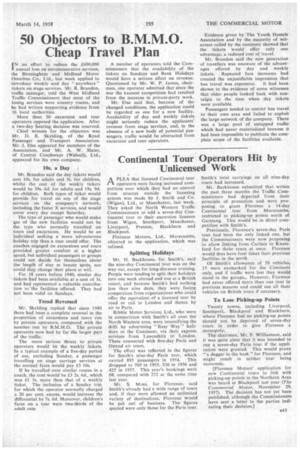50 Objectors to B.M.M.O.
Page 117

If you've noticed an error in this article please click here to report it so we can fix it.
Cheap Travel Plan
IN an effort to reduce the £600,000 I annual loss on unremunerative services, the Birmingham and Midland Motor Omnibus Co., Ltd., last week applied to introduce weekly and day " anywhere " tickets on stage services. Mr. R. Brandon, traffic manager, told the West Midland Traffic Commissioners that most of the losing services were country routes, and he had written supporting evidence from 16 local authorities.
More than 50 excursion and tour operators opposed the application. After a two-day hearing decision was reserved.
Chief witness for the objectors was Mr. D. E. Skelding, of the Road Passenger and Transport Association. Mr. J. Else appeared for members of the Association, and Mr. A. W. Slater, of Central Coachways (Walsall), Ltd., appeared for his own company.
10s. a Day
Mr. Brandon said the day tickets would cost 10s. for adults and 5s. for children, whilst the cost of the weekly tickets would be 39s. 6d. for adults and 19s. 9d. for children. Both types of ticket would provide for travel on any of the stage services on the company's network, including the faster X services, and would cover every day except Saturday.
The type of passenger who would make yse of the new facilities would not be the type who normally travelled on tours and excursions. He would be an individual seeking a more adventurous holiday trip than a tour could offer. The coaches engaged on excursions and tours provided greater comfort at a higher speed, but individual passengers or groups could not decide for themselves about the length of stay at beauty spots, nor could they change their plans at will.
For 18 years before 1440, similar day tickets had been available at a cost of 5s. and had represented a valuable contribution to the facilitiesoffered. They had not been valid on Sundays.
Trend Reversed Mr. Sledding replied that since 1940 there had been a complete reversal in the proportion of excursions and tours run by private operators, compared with the number run by B.M.M.O. The private operators now had by far the larger part of the traffic.
The more serious threat to private operators would be the weekly tickets. In a typical example of a five-day period of use, excluding Sunday, a passenger travelling on stage carriage services at the normal fares would pay £3 10s.
If he travelled over similar routes in a coach, the cost would be £3 2s. 6d., which was £1 3s. more than that of a weekly ticket. The inclusion of a Sunday trip, for which the operator normally charged a 20 per cent. excess, would increase the differential by 7s, 6d. Moreover, children's fares on a tour were two-thirds of the adult rate. A number of operators told the Commissioners that the availability of the tickets on Sundays and Bank Holidays would have a serious effect on revenue. Questioned by Mr. W. P. James, chairman, one operator admitted that since the war the keenest competition had resulted from the increase in private-party work.
Mr. Else said that, because of the changed conditions, the application could be regarded as one for a new facility. Availability of day and weekly tickets might seriously reduce the applicants' revenue from stage services, and, in the absence of a new body of potential passengers, traffic would be abstracted from excursion and tour operators. Evidence given by The Youth Hostels Association and by the majority of witnesses called by the company showed that the tickets would offer only one advantage, a reduced cost of travel.
Mr. Brandon said the new generation of travellers was unaware of the advantages offered by day and weekly tickets, Repeated fare increases had created the unjustifiable impression that bus travel was expensive. It had been shown in the evidence of some witnesses that older people looked back with nostalgia to the time when day tickets were available.
Passengers tended to restrict bus travel to their own area and failed to exploit the large network of the company. There was a large pool of untapped traffic which had never materialized because it had been impossible to publicize the complete scope of the facilities available.












































































































































































